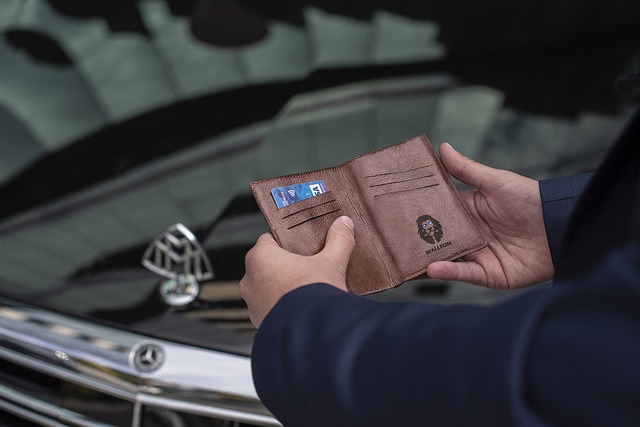Understanding Crypto Wallets: Essential Guide for 2025
Author: Jameson Richman Expert
Published On: 2025-05-07
Prepared by Jameson Richman and our team of experts with over a decade of experience in cryptocurrency and digital asset analysis. Learn more about us.
As we move further into 2025, the significance of understanding crypto wallets cannot be overstated. With the rapid expansion of digital currencies and their increasing acceptance in various sectors, crypto wallets have become indispensable tools for both novices and experienced investors. A crypto wallet is not merely a storage solution; it serves as a gateway to the world of cryptocurrencies, enabling users to store, send, and receive digital currencies in a secure manner. This comprehensive article aims to provide an in-depth understanding of the types of crypto wallets available, their security features, how to select the right one, and the anticipated evolution of crypto wallets in 2025.

What is a Crypto Wallet?
A crypto wallet is a digital interface that facilitates interaction with blockchain networks. Unlike traditional wallets that physically hold cash, crypto wallets manage cryptographic keys—specifically, public and private keys. The public key can be likened to an email address, enabling others to send you cryptocurrency, while the private key acts like a password, granting you access to your digital funds. Grasping the function of these keys is essential for effective asset management and security.
In essence, a crypto wallet operates as a bridge connecting you to your cryptocurrency holdings, allowing you to perform transactions on the blockchain. Many wallets also provide functionalities for tracking transaction history, managing multiple assets, and engaging with decentralized applications (dApps) directly from the wallet interface. The rapid evolution of cryptocurrencies necessitates versatile wallets that can support various digital assets, further highlighting the importance of understanding the different wallet types and their unique features.
Types of Crypto Wallets
Crypto wallets can be broadly categorized into several types, each offering unique features and varying levels of security:
1. Hot Wallets
Hot wallets are online wallets that are always connected to the internet, making them convenient for users who engage in frequent transactions. Typically available as mobile apps or web-based platforms, hot wallets allow users to quickly send and receive cryptocurrencies. However, this constant connectivity also exposes them to potential cyber threats. Popular examples of hot wallets include Coinbase Wallet and Binance Wallet, where users can easily register and start managing their digital assets securely through platforms like Binance.
Ideal for active traders who require rapid access to their funds, hot wallets often come equipped with features such as price alerts, market analytics, and seamless integration with trading platforms. Users, however, must remain vigilant about their security practices, including regular password updates and the use of two-factor authentication (2FA) to mitigate hacking risks. While hot wallets generally provide user-friendly interfaces and facilitate quick transactions, users should be cautious of phishing attacks and other online threats. Moreover, many hot wallets offer easy swapping capabilities between different cryptocurrencies, further enhancing their usability for day-to-day trading.
2. Cold Wallets
Cold wallets, in contrast, are offline storage solutions that provide enhanced security against online threats. These wallets include hardware wallets like Trezor and Ledger, as well as traditional paper wallets. Cold wallets are particularly suitable for long-term investors who do not require frequent access to their funds.
By storing private keys on devices that are not connected to the internet, cold wallets significantly reduce the risk of hacking. They typically incorporate additional security features, such as PIN codes and recovery phrases, to safeguard your assets. For users planning to invest significantly in cryptocurrencies, utilizing cold storage can be a strategic approach to protect their holdings. Furthermore, cold wallets often support a diverse range of cryptocurrencies, making them versatile options for serious investors. It's essential to recognize that while cold wallets offer superior security, their setup may be more complex, potentially posing a challenge for beginners.
3. Custodial Wallets
Custodial wallets are managed by third-party services that hold your private keys on your behalf. While they provide a user-friendly experience, particularly for newcomers, custodial wallets require users to place trust in the service provider. Platforms like Bitget offer custodial wallet services that can be accessed via this link.
Although custodial wallets simplify the management of cryptocurrencies, they carry inherent risks. If the service provider experiences a security breach, users may lose access to their funds. Therefore, it is crucial to select reputable platforms with robust security measures and a proven track record of reliability. Conducting thorough research and reviewing user feedback before choosing a custodial wallet is essential. Some custodial wallets may also offer insurance against losses, providing additional peace of mind. Additionally, custodial services often include features such as automatic trading and portfolio management, which can be beneficial for users who prefer a hands-off approach to investing.
4. Non-Custodial Wallets
Non-custodial wallets empower users by allowing them to maintain complete control over their private keys. This type of wallet is favored by individuals who prioritize security and privacy. Examples include Exodus and Electrum.
Non-custodial wallets facilitate direct interaction with the blockchain, providing users with greater autonomy over their funds. They often incorporate advanced security features, including multi-signature support and recovery seed phrases, which enhance user control and security. By opting for a non-custodial wallet, users assume responsibility for their security, which can be both empowering and demanding. Regular backups and secure management of recovery phrases are essential to prevent loss of access to funds. Additionally, many non-custodial wallets are integrating with DeFi platforms, enabling users to engage in yield farming and staking directly from their wallet interfaces, expanding their investment opportunities.
How to Choose the Right Crypto Wallet
Selecting the right crypto wallet involves considering several factors tailored to your individual needs, including your investment strategy, transaction frequency, and level of technical expertise. Here are some crucial considerations:
1. Security Features
Security is the foremost priority when choosing a crypto wallet. Look for wallets that provide two-factor authentication (2FA), strong encryption, and backup options. Hardware wallets are generally regarded as the safest choice due to their offline nature.
Additionally, ensure the wallet has undergone third-party security audits and has a history of robust security practices. Understanding the security architecture of the wallet can help mitigate risks associated with potential vulnerabilities. Familiarize yourself with common scams and phishing attempts, as well as the wallet's recovery process in case access is lost. Consider community feedback on any security breaches or vulnerabilities associated with the wallet provider, as this can provide valuable insights into the wallet's reliability.
2. User Interface
The wallet's interface should be intuitive and easy to navigate, especially for newcomers. Experiment with different wallets to find one that aligns with your comfort level. Key factors to consider include mobile versus desktop access, transaction ease, and customer reviews regarding user experience. A user-friendly interface can greatly enhance your overall experience and streamline the management of your digital assets. Look for wallets that offer educational resources or tutorials to assist you in getting started, as well as demo versions to familiarize yourself with their functionalities.
3. Supported Cryptocurrencies
Verify that the wallet you choose supports the cryptocurrencies you intend to store. Some wallets are designed for specific coins, while others are multi-currency. Additionally, assess the wallet's compatibility with decentralized finance (DeFi) platforms if you plan to participate in this growing sector. With the expanding array of digital assets, having a wallet that accommodates multiple cryptocurrencies can facilitate diversification. Investigate the wallet's update history to ensure it regularly adds support for new cryptocurrencies, and check user feedback regarding any issues related to specific coin compatibility.
4. Customer Support
Responsive customer support can significantly impact your experience, especially when encountering issues or needing assistance. Evaluate reviews and ratings to gauge the quality of customer support offered by the wallet provider. Look for resources such as live chat, email support, and comprehensive FAQs to assist you in times of need. A proactive customer service team can provide reassurance and facilitate efficient issue resolution. Furthermore, consider community support available through forums or social media channels related to the wallet, as engaging with fellow users can yield valuable insights and tips.

Future of Crypto Wallets in 2025
As we approach 2025, the landscape of crypto wallets is poised for significant transformation. With technological advancements on the horizon, we anticipate the introduction of more secure wallet options, improved user experiences, and increased integration with decentralized finance (DeFi) platforms.
Regulatory changes may also shape the functionality of wallets, particularly regarding compliance and security standards. Staying informed about these developments will be crucial for users to ensure they are utilizing the most current and secure methods for managing their digital assets. The emergence of new blockchain technologies and standards is likely to contribute to innovations in wallet capabilities, ultimately enhancing user experiences.
Additionally, as the cryptocurrency market matures, there will likely be a rising demand for wallet solutions that facilitate seamless cross-chain transactions. Innovations in interoperability will allow users to transact across various blockchain networks, significantly improving the overall user experience. The integration of advanced technologies, such as artificial intelligence (AI), may also play a role in bolstering security measures and enhancing transaction efficiency. Users can expect to see wallets employing machine learning algorithms to detect unusual transaction patterns, thereby providing enhanced fraud protection. Furthermore, biometric security measures could become standard practice, adding an extra layer of protection for users' digital assets.
Getting Started with Crypto Wallets
For those new to the world of crypto wallets, education is key. Start by familiarizing yourself with the fundamentals of cryptocurrency management. Utilize resources such as The Ultimate Crypto Strategies for 2025, which offers insights into effective strategies for navigating the crypto landscape. Additionally, consider exploring Uncover the Best Crypto Coins to Invest in for 2025 to identify promising investment opportunities.
For those interested in mastering the technical aspects of crypto trading, Mastering AI Crypto Traders provides a comprehensive guide to achieving success in this dynamic environment.
Lastly, understanding how to identify hidden gems is crucial for any investor. The article The Ultimate Guide to Uncovering Hidden Crypto Gems in 2023 can equip you with the knowledge needed to spot promising opportunities. Engaging in online communities or forums can further enhance your learning experience and keep you updated on the latest trends in the crypto space.
Conclusion
In conclusion, a thorough understanding of crypto wallets is essential for anyone looking to navigate the evolving landscape of digital currencies in 2025. By familiarizing yourself with different wallet types, evaluating their features, and keeping an eye on emerging trends, you can make informed decisions regarding the secure management of your crypto assets. Always prioritize security and stay educated to ensure you are well-prepared for the exciting journey ahead in the crypto space. Embracing evolving technologies and understanding the security landscape will empower you to maximize the potential of the digital asset revolution. Stay proactive in your education, regularly reassess your wallet choices, and adapt to the fast-paced nature of the crypto market.

Additional Resources
For further reading and to enhance your understanding of crypto wallets and digital currencies, consider exploring the following resources:
- Investopedia - Cryptocurrency Wallet
- Blockchain.com Wallet
- Coinomi - Multi-Currency Wallet
- Bitcoin.org - Choose Your Wallet
Staying informed and continuously educating yourself about the latest trends and technologies in the crypto space will greatly aid you in navigating the complexities of digital currency management. Consider subscribing to newsletters or following industry leaders on social media to keep your knowledge current and connect with like-minded individuals.
Glossary of Crypto Wallet Terms
To further enhance your understanding of crypto wallets, here are some key terms that you may encounter:
- Blockchain: A decentralized digital ledger that records transactions across many computers securely.
- Private Key: A secret number that allows you to access your cryptocurrency; it must be kept confidential.
- Public Key: An address that you can share with others to receive cryptocurrency.
- Seed Phrase: A series of words generated by your wallet that can be used to restore your wallet.
- DeFi (Decentralized Finance): Financial services using smart contracts on blockchains, eliminating the need for traditional financial intermediaries.
- Interoperability: The ability of different blockchain networks to communicate and operate with one another.
- Phishing: A cyber-attack that attempts to trick users into providing sensitive information, such as passwords.
Understanding these terms will assist you in navigating conversations and resources within the cryptocurrency community.
Case Studies: Successful Crypto Wallet Implementations
To further illustrate the impact and effectiveness of various crypto wallets, consider the following case studies:
- Case Study 1 - Exodus Wallet: Exodus has successfully attracted millions of users by providing a highly user-friendly interface combined with robust security features. Their support for multiple cryptocurrencies and direct integration with DeFi platforms has positioned them as a leading choice for both beginners and seasoned investors.
- Case Study 2 - Ledger: Ledger has established itself as a premier hardware wallet provider, focusing on security and user education. With features like the Ledger Live app, users can manage their assets easily while knowing their private keys are stored securely offline.
- Case Study 3 - Binance Wallet: By incorporating advanced trading features and a vast selection of supported cryptocurrencies, Binance Wallet has catered to active traders and investors, driving significant user engagement and loyalty.
These case studies demonstrate how effective wallet design and features can significantly enhance user experience and security, ultimately contributing to the success of a wallet provider in the competitive crypto space.